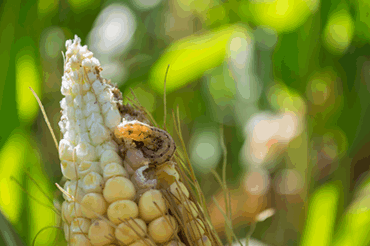- by AATF Africa
The army worm infestation has affected more than 2,000 acres within the Busia sub county hitting hardest the poor subsistence farmers who fully depend on their farms. Charles is wondering if this problem hit him for choosing to go against his normal practice. Usually, he says, he would plant only an acre of his four acre farm but because he had access to a loan, he decided to plant the whole farm with maize. But as fate would have it, he finds himself at the mercy of the vicious worm — and still stuck with a loan.
The fall armyworm is a destructive caterpillar that is indigenous to the Americas, the ‘fall’ referring to the season during which it tends to migrate to the United States. Its presence in the African continent was first reported in West Africa particularly Nigeria around January 2016. The pest is known to cause extensive crop losses of up to 90% percent depending on existing conditions.
Speaking to journalists in Busia — Kenya, Dr Emmanuel Okogbenin, Director of Technical Operations at the African Agricultural Technology Foundation (AATF) said the worm causes severe damage to plants such as maize, rice, pasture, sorghum, pear millet, cotton and some vegetable crops.
‘Attack on maize at vegetative stage can result to 100% crop loss if no control is taken. An attack on young maize can totally reduce plant density, warranting re-planting. Destruction of the maize silk or the tassels results to reduced pollination and hence low grain formation,’ says Dr Okogbenin.
Farmers have been advised to use pesticides to address this problem. In Brazil, where armyworms can breed all year round, controlling them costs an estimated US$600 million a year. The cost of control in Southern Africa hasn’t been determined yet but some African governments like Zambia decided to use air force planes to spray large tracts of affected land with insecticide.
According to a Kenya local government agricultural extension officer, Catherine Mumo, farmer education is being undertaken.
“We are going to the farms to educate the farmers on the chemicals to use to spray the worms and the government is providing the chemicals at 20 dollars for a litre which can be used for up to 14 hectares. Depending on the level of infestation, it may need to be sprayed repeatedly over 3 weeks. On a four-hectare farm, it may cost a farmer almost 100 dollars,” Mumo says.
Charles Weko tried spraying a few weeks ago, but fell ill immediately after. ‘My chest hurt and according to the local doctors — where I sought treatment — my kidneys were also affected. I have been down and just came to the farm this week to assess the extent of damage in my absence. Surely where is God?” He gasps, holding back tears.
Dr Okogbenin states that Bt maize (maize that has been genetically altered to express proteins poisonous to certain insects) has been known to have an impact on the worm.
‘The worm does not consume this variety because of the proteins in the maize that are poisonous to it – though perfectly safe to humans. Less than 30% of the Bt maize is affected by the worm” he adds.
However, presently the government of Kenya does not permit planting of GM crops. The Bt maize that was given conditional environmental release early 2016 is yet to get into the hands of farmers such as Charles. The maize may not control the worm 100% but it surely would provide an answer to reducing crop losses due to army worm infestation.



















































































